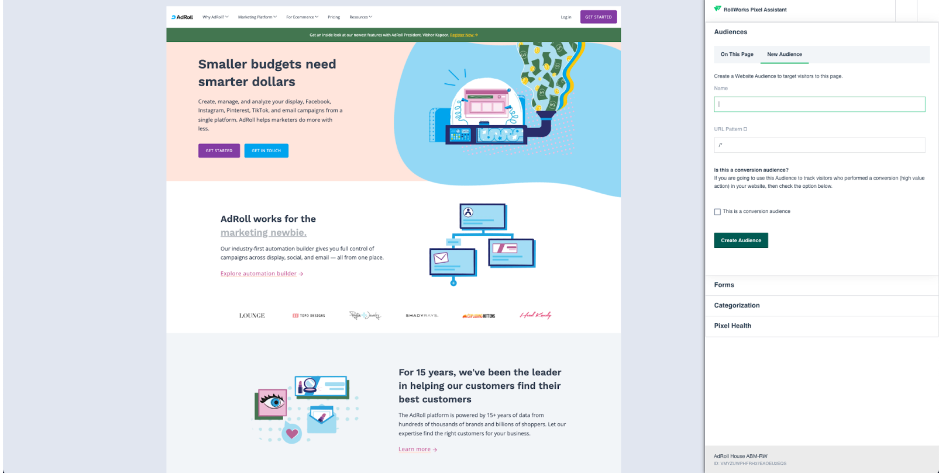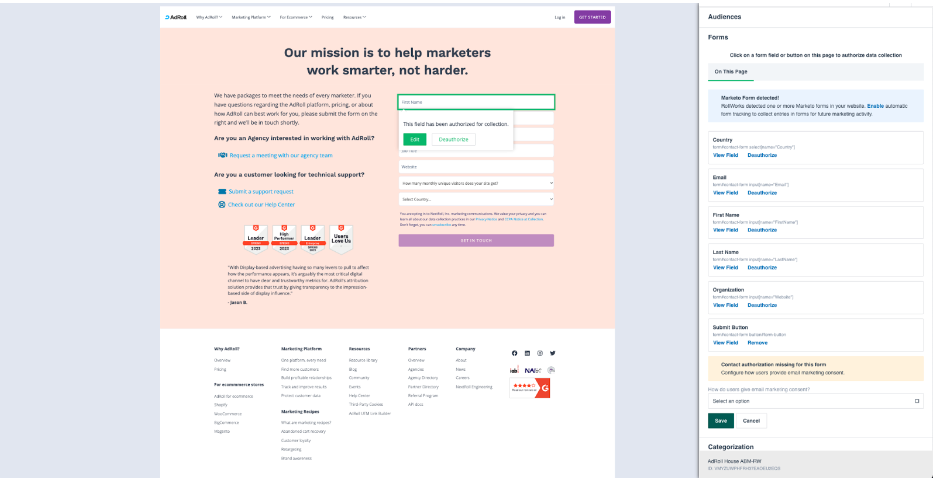Modern-day marketers know the value and need for website pixels – those bits of code placed on a website that record interactions and create anonymous profiles of users. Pixels help retarget potential customers across the web and provide information about who’s visiting a company’s website.
However, adding pixels and ensuring they’re working in real-time – before a campaign is running and it’s too late – isn’t secondhand knowledge to most marketers. And even if it is, marketers’ time would be better spent elsewhere if they had reliable technology to do it for them.
We know this because NextRoll teams constantly listen to and learn from our AdRoll and RollWorks customers.
“We found a lot of customers were submitting Support tickets because their segments weren’t working,” said Michael Stern, Sr. Product Manager. “Most of the time, it’s because the pixels were not set up correctly.”
So not only did the NextRoll team want to create a tool that would identify these issues early and often, they wanted one that would empower customers for success from the get-go.
Pixel Assistant, A Brief Rundown
Under the Audiences or Website Audiences tab on the AdRoll and RollWorks platforms, respectively, customers can access various pixel-related tools.
Pixel Coverage shows how many pages on a customer's website have tracking pixels connected – ideally, this number is 100%. If not, customers can instantly download a report showing what URLs are missing pixels, if that URL is a marketing campaign landing page, or if it is associated with an audience segment.
Pixel Status helps collect data from forms on a customer’s website and where customers can opt-in to specific form fields for collection on any form on their site.
Pixel Assistant helps troubleshoot any Pixel issues, create audiences from your website, and authorize forms for data collection (something very important as we rely more heavily on first-party data in a privacy-first web environment).

“Pixel Assistant was created so a customer can ensure an absolutely flawless pixel integration that has coverage across their entire site and the ability to troubleshoot with the least amount of clicks,” Michael said.
Our platform is injected directly on top of a customer site so they can make changes and create audiences while seeing their site in front of them.
“Before, we had these great capabilities, but customers would have to have two screens or look at things in a split-screen fashion to understand what they’re doing as it corresponds to their site,” said Michael.

First-Party Data Forms
Another way we integrated our customers' feedback into the Pixel Assistant tool was to create an area for collecting CRM data. Our competitors don’t do this, or if they can do it – they don’t do it very well.
“A lot of our customers rely on third-party sources, like Hubspot or Marketo, to put forms on their site and aggregate that data,” said Michael. “But through the Forms tab on the Pixel Assistant, customers can now collect this CRM data directly through the platform.”
This is useful because customers want AdRoll or RollWorks to be a one-stop shop for their marketing campaigns. No more switching between tools, platforms, and sites to gather data and launch campaigns.
Forms and quickly and easily collecting first-party data is vital to healthy marketing plans, as third-party cookie tracking will soon become a thing of the past on Chrome (and already is on Firefox and Safari).
“We wanted to enable customers to collect everything from a site they could want,” said Michael. “And we wanted to empower customers to do it all themselves.”

Real-Time Data
The sooner marketers can see data, the sooner they can make cost-saving decisions like ramping up or shutting down a campaign based on performance. Most third-party tools will pull data on a daily basis, but Pixel Assistant helps AdRoll and RollWorks customers see what’s happening in real-time.
“Pixel Assistant is a better user experience,” said Michael. “It simplifies things, lets customers know exactly what they're getting, and tells a more cohesive story.”
On our end, NextRoll Engineers have seen 93% fewer Support tickets from customers asking for help with pixel configuration. This means we’re saving customers' time and our time, which we’re using to create more innovative customer experiences and solutions for the future.
Check out the AdRoll Blog and RollWorks Blog to learn more about what new tools are available to customers!
Tags:
- engineering
- customer obsession


